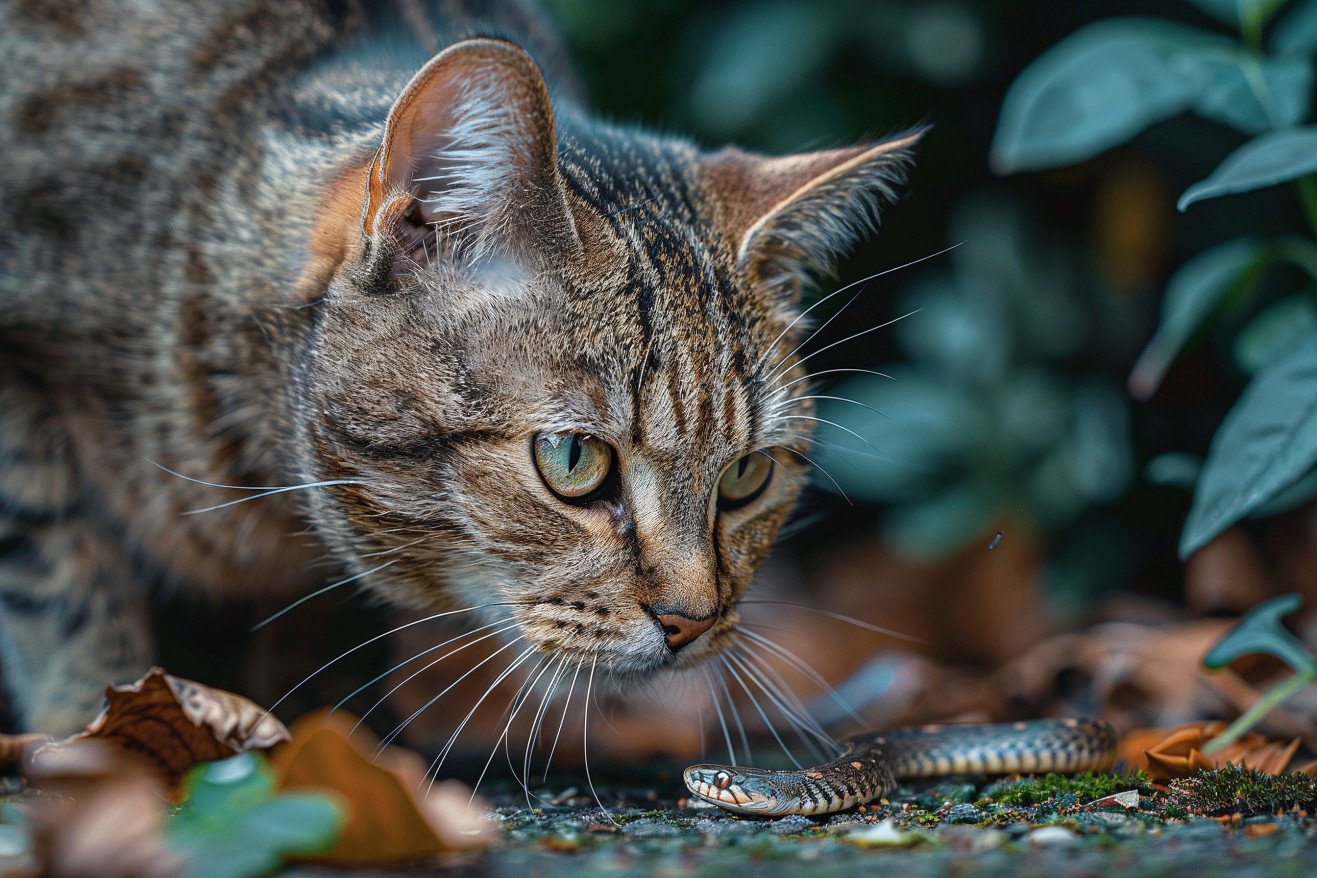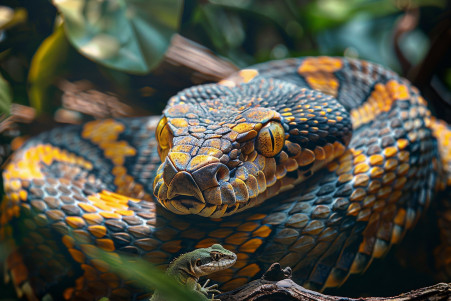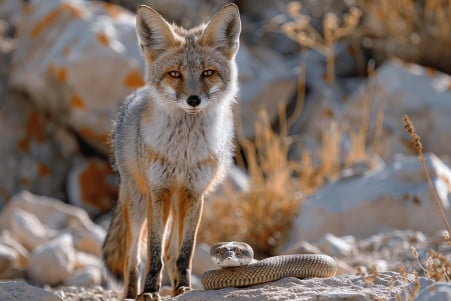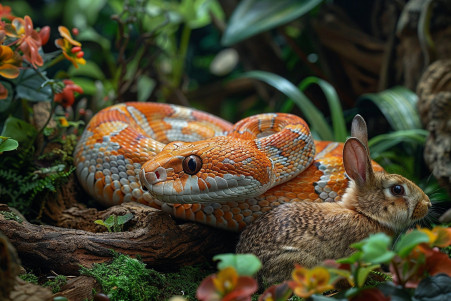Do Cats Eat Snakes? Exploring the Predator-Prey Relationship
28 May 2024 • Updated 28 May 2024

Whether they're driven by their hunting instincts or a need to protect their territory, cats may encounter snakes in the wild – but do cats actually eat snakes? Cats do eat snakes, but the likelihood of a cat preying on a snake depends on the size of the cat and the size and species of the snake. While domestic cats may kill small snakes, they tend to avoid larger, venomous snakes. Meanwhile, larger wild cats like bobcats and lynx are known to consume snakes as part of their regular diet.
This article delves into the copious research of feline ethologists, herpetologists, and wildlife experts to provide a thorough overview of the cat-snake relationship. By investigating hunting patterns, nutritional requirements, and ecological implications, this article offers valuable information on the frequency and purpose of cats eating snakes in the wild and in human environments. By exploring the dangers, rewards, and evolutionary influences, this article offers a rich and detailed look at the multifaceted predator-prey relationship between feline and ophidian.
Do cats eat snakes?
Cat Hunting Behaviors and Snake Hunting Techniques
Cats are natural hunters, and their hunting behaviors have been shaped by evolution over thousands of years. As obligate carnivores, cats use their senses, including their excellent sense of smell and their acute hearing, to find prey, which they then hunt with patience and focus. When hunting snakes and other reptiles, cats use a specific hunting pattern, which includes a low, slow stalk, a fast chase, and a final pounce that involves hitting the prey with their front paws and claws.
While cats may not go through the entire hunting pattern, their hunting instinct is strong, even in domesticated cats. Cats are cautious hunters, and they tend to avoid larger or venomous snakes that could hurt them. Feral cats that don’t have access to other food sources are more likely to hunt and eat snakes than well-fed domesticated cats, who are more likely to play with snakes they catch. However, all cats have the ability to use their hunting behaviors to find, stalk, and kill small reptiles, including snakes.
Risks and Precautions: Dealing With Snakes That Have Been Killed by Cats
If a cat has killed a snake, it is important to take precautions when cleaning up and disposing of the body. Even dead snakes can be dangerous because their venom and other toxins can still be active. According to Can a house cat kill snakes?, people should not come into contact with the snake directly and should wear gloves and other protective gear when dealing with a snake that a cat has killed.
It is also important to determine if the snake was venomous or non-venomous before taking any action. As noted in My cat found, killed, and ate a snake today, and I am not sure what to do. I am not sure if the snake was poisonous or, it is important to ensure that the snake is disposed of properly to avoid any potential danger to other animals or people. This is important for the safety of both pets and people.
How to Treat a Snake Bite and Veterinary Care for Cats
If a cat has been bitten by a snake, it is important to seek veterinary care immediately in order to minimize the impact of the venom. As noted in the Venomous Snakebites in Cats article from the UC Davis School of Veterinary Medicine, the signs of snakebites in cats can be different based on the type of venom that is injected, and can include swelling, bleeding, paralysis, and other life-threatening symptoms.
According to How To Recognize a Snake Bite on a Cat, first aid measures such as applying a pressure bandage can be used to slow the spread of venom until the cat can be seen by a veterinarian. Treatment for snake bites in cats may include antivenin, IV fluids, antibiotics, and other supportive therapies, as noted in the Snake Bites in Cats article. It is important to note that providing the veterinarian with information about the snake that bit the cat can help them determine the best course of treatment, as mentioned in the Snake Bite - cats article from Lort Smith Animal Hospital.
Why Do Cats Kill Snakes but Not Eat Them?
Cats are attracted to the movement of snakes and will kill them, but they don’t often eat the snake they’ve killed. This is likely because the cat is acting on its predatory instincts and using the snake as a toy or a way to practice hunting, rather than as a food source. As Will Cats Keep Snakes Away? Facts, Dangers & Prevention Tips - Catster notes, cats are likely to see killing snakes as a form of play or a way to protect their territory, rather than a way to get a meal.
Feral cats that don’t get regular meals are more likely to eat the snakes they catch than pet cats that are fed by their owners, according to Can Cats Keep Snakes Away from Your House? – Try-J Enterprises, LLC. In addition, the danger of being bitten or envenomated by a snake may prevent cats from eating the snakes they catch. Cats are known to carefully consider the risks of their actions and are likely to avoid snakes that are larger or venomous and could pose a threat to them.
Snake Eggs: A Tasty Snack or Dangerous Prey for Feline Predators?
In addition to hunting adult snakes, feline predators may also hunt snake eggs in the wild. Several species of wild cats, including bobcats, have been documented raiding snake nests and eating the eggs. While snake eggs could be a nutritious food source for feline predators, there are also potential dangers.
According to What Animals Eat Snakes?, feline predators that eat snake eggs could be exposed to toxins or pathogens in the eggs or the nest. Feline predators that try to eat snake eggs may also be attacked by the adult snakes protecting the nest.
Conclusion: Understanding the Complex Predator-Prey Relationship Between Cats and Snakes
Cats are natural predators with an instinctual drive to hunt, including targeting snakes as potential prey. While domestic cats may kill small, non-venomous snakes, they generally avoid larger or venomous snake species. Wild cat species, such as bobcats and lynx, regularly include snakes and their eggs in their diets.
Interactions between cats and snakes can be dangerous for both animals and require careful consideration and management. This predator-prey relationship is an important consideration for cat owners and snake handlers alike.


